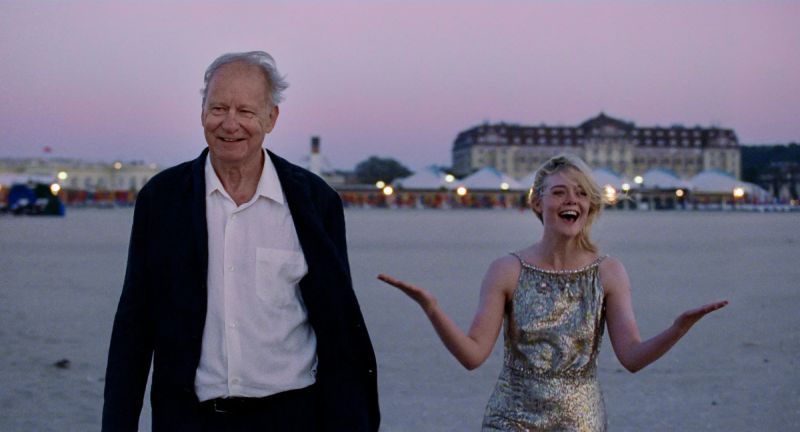The sentimental value of material things can be a burden shared by several generations. Houses do not speak, but if the walls that have sheltered emotions could transmit them to the next inhabitants, we would live in a loop of inherited or confronted feelings, without being able to free ourselves: our own and those that a whole constellation of ancestors struggled to silence or hide. The house, the stories it houses, the walls themselves, and the successive transformations become, in Valor sentimental, one more character that embraces the rest, sometimes with love, sometimes as a burden.
At the beginning of Joachim Trier‘s latest film, we see images of a house in Oslo, which has been home to four generations and whose last inhabitant, the psychologist Sissel – mother of Agnes (Inga Ibsdotter Lilleaas) and Nora (Renate Reinsve), divorced from the film director Gustav (Stellan Skarsgård) – is about to pass away. During her childhood, Agnes was in one of her father’s cult films, but did not want to pursue an acting career; Nora, however, has made a name for herself in classical theatre, despite her bouts of stage fright. In a long and harrowing introductory sequence, we enter fully into the personal conflict that lies beneath Nora’s psychological inability to cope with her work. She goes in and out backstage, returns to the dressing room, rips off her clothes because the corset won’t let her breathe, tries again and again, begs a colleague, who is also her lover, to make love, to slap her. What Nora wants is for him to get her out of this blockage through a stronger emotion.
Trier and his regular screenwriter, Eskil Vogt‘s portrait of the actress immediately set us up for a drama that we will soon describe as a family drama. Her father is a renowned film director, and she has stage fright; her mother is a psychologist, and she refuses therapy. After putting us in the situation, Sissel’s death triggers, like a trigger, the explosion of buried, mismanaged, and denied emotions that Nora harbours towards the rest of her family.

At one of the most crucial moments in our lives, when the first human structure we have ever known falls apart, taking material form in a legacy of property and objects that force us to review our history, both sisters are faced with an inescapable conflict that they must deal with, fuelled by situations experienced throughout their childhood and youth. On the one hand, the absent father, with whom Nora has the worst relationship, on the other, the mourning for her mother, as well as her ambivalent relationship with her vocation as an actress, probably anchored in her impostor syndrome, due to the lack of recognition from Gustav, both father and director of actors. At the same time, she has chosen her profession to escape from her own life, to be someone else, and to be able to move on. Nora also has a score to settle with her sister, while her relationship with her partner and lover Jakob (Anders Danielsen Lie) is only apparently under control.
Gustav’s return for her mother’s funeral and his offer for Nora to play in his next film, whose script is intended to settle family scores, will open a new chapter in the family history. Indignant and resentful, Nora rejects her father’s offer, who asks her to play her grandmother, Gustav’s suicidal mother, who also marked Gustav’s childhood, within the same walls. The director replaces her with a young Hollywood star, Rachel Kemp (Elle Fanning), with whom she coincides at the Deauville Festival. This crisis will be a new step into the abyss between father and daughter, feeding the hell of bad decisions, jealousy, and pain. Nora is torn between pride and intelligence, kindness and self-interest, resentment and love, as the provisional foundations of her life disintegrate one after the other.

Renate Reinsve’s great charisma hovers over Sentimental Value, but above all, we see her suffer (with her sister, with her father, with her lover, at work). In a different register to that of The Worst Person in the World, the actress never stops crying and grieving throughout the film, only exceptionally relaxed when she is in the company of her little nephew. But she is not the only one; Elle Fanning, in her rehearsals, breaks down in pain, in a sea of tears. Eskil Vogt’s script for Sentimental Courage is complex, with humorous touches (the grandfather gives the grandson a set of DVDs, including The Pianist and Irreversible), nods to the masters Bergman and Allen (Nora listens through the heating duct to her mother’s therapy sessions, like Gena Rowlands in Another Woman, 1988) and jokes about the craft, in the characters of the cinematographer and Gustav’s manager. However, we appreciate his work most in his restraint and his subtle, between-the-lines revelations of the dynamics and ways of resolving family conflicts. Much more so, of course, than in the scenes where sentimentality is overtaken by sentimentality.
Both Elle Fanning and Renate Reinsve do an excellent job, but we can’t deny that when Stellan Skarsgård is on screen, the rest blurs. His presence, beyond his dialogue, is eloquent in its own right, and his interaction with his daughter Nora reveals much more by what it reveals than what it shows. To be a good manipulator, you have to be a good psychologist, and Gustav exhibits all his skills with everyone he interacts with.
Trier and Vogt present us with a painful story, but above all a tale of healing. The most toxic social organisation is the one that is not chosen and that, through blood ties, weighs on us all our lives, forcing us to feel guilty for not fitting in or for not responding to expectations. To be able to survive this and not lose oneself implies having taken the definitive step towards maturity, and Nora’s character achieves this by ceasing to blame her parents for her mistakes and misfortunes, taking responsibility for her own life, and accepting that some unchosen relationships can be reformulated from an adult perspective. Forgiveness and acceptance are neither equivalent nor necessary. The most important thing is to overcome suffering and free oneself to live without traumatic attachments. This is the pending lesson for Nora, the sister who suffered the most from the lack of affection and the one who most needs to turn the page. She has not formed a family like Agnes, who has lived a centred and resilient life, despite her experience, perhaps because she does not want to repeat history or because history prevents her from doing so, but the case of the two sisters also shows that upbringing is not everything.
Sentimental Value offers its most relaxed pulse in the reflection on cinema and the father’s work, while, on the contrary, it borders on excess in the more emotional scenes. Nonetheless, the whole is outstanding, with its trademark depth-charged elegance of fluid writing, impeccable cinematography, and soundtrack. The final part, with a denouement that brings together all the plots and all the dramas, is as coherent as the rest of a beautiful, efficient film, brimming with love for cinema and its transformative power.
“Sentimental Value” won the Grand Jury Prize at the 78th Cannes Film Festival. Information updated on 24 May 2025.







No one has posted any comments yet. Be the first person!